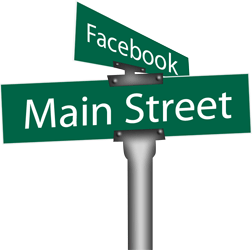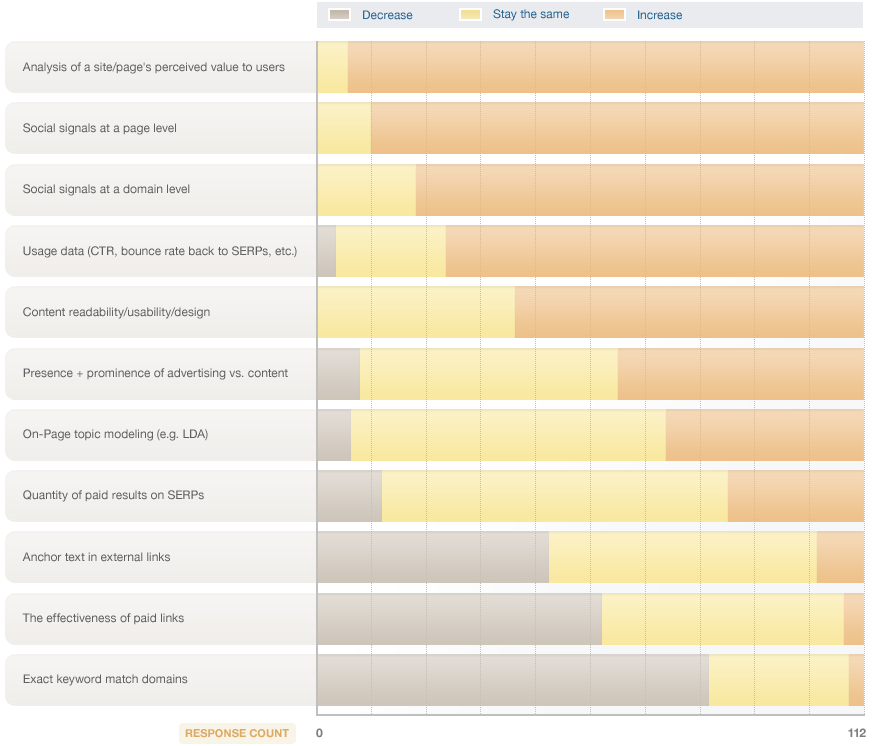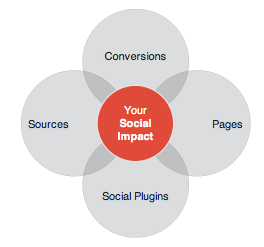
Credit: Social On Main
So social media has gone mainstream. No seriously: MAINSTREAM. How do I know? Well, aside from the fact that every second piece of print or outdoor advertising seems to have a “Like” icon somewhere on it, Google has fully incorporated social tracking into Google Analytics. And that means that social media is so much more closer to being fully trackable and attributable as a source of traffic in the sales funnel. So what does this mean for your business (or your clients’)? Well, it means that you can now understand how social is affecting is affecting your bottom line online. And there are two ways it’s doing that: search rankings and actual conversion rankings.
Social Signals & Search Rankings
Okay, before we get into what you need to know about tracking actual conversion from social media, we need to address how social is affecting your search rankings. Why? Because search offers an opportunity to target users by intention. Basically, when someone searches for something, they are already that much more engaged — i.e. they’re actively looking for products/services that you provide. Consequently, it shouldn’t come as a surprise that in SEOmoz’s 2011 search ranking factors, social signals were not only a variable, but pegged as a variable that will only increase in importance in the near future.

Source: SEOmoz 2011 Search Ranking Factors
So what does this have to do with measurement? Well, quite a bit, actually. You see, when it comes to Facebook Likes impacting both search rankings and personalized results, Microsoft actually has a bit of an edge on Google because Microsoft has a deal with Facebook where Likes (and the like) directly impact Bing results. This, however, is not the whole picture. But back in June, Google acquired PostRank, a service that helped marketers quantify (albeit arbitrarily) social actions such as Likes, Tweets, etc. And now that the sun has set on PostRank as a standalone service, it’s pretty safe to assume that those social metrics have been fully integrated into the Google algorithm. So the first thing you need to know about measuring social is how social activity is impacting your search rankings. In other words, if you’re churning out keyword relevant social content and that content is actually being shared, Liked and Tweeted, then you should be able to correlate that with how your change in search rankings. And if you can’t, then you’re probably doing something wrong.
Tracking Social Conversions

The Four Face of Social Analytics
Okay, so now that you’re monitoring your search rankings and trying to correlate how your social wins are impacting your targeted keyword ranking, you probably want to get down to the nitty-gritty of quantifying all the money and (wo)man-hours you’ve invested in things like community management, Facebook Page updates, and promoting your social content. Well, in addition to the (plausible and grounded) speculation about Google integrating social signals into their search ranking algorithm, the search giant has outright integrated (what seems like) PostRank metrics into Google Analytics. Specifically, there are four new sets of reports that you can use to quantify your social efforts:
- Sources: As your content is shared and people come to your site, it’s important to understand how visitors from different social sources engage with your site.
- Conversions: Shared content URLs become the entry points into your site, driving traffic from social sources. Measuring the conversion and monetary value of this traffic will help you understand the impact of Social on your business.
- Pages: People increasingly engage with, share, and discuss content on social networks. It’s important to know which pages and content are being shared, where they’re being shared, and how.
- Social Plugins: Adding Social Plugin buttons to your site (for example, Google “+1” buttons) allows your users share content to social networks directly from your site. Your social plugin data shows you which content is being shared, and on which networks.
Of all of these, the most interesting social report is the Conversion report, because this is the report that you can use to actually quantify what social traffic (and actions) are worth to your bottom-line. Specifically, Google has even gone as far as distinguishing between three kinds of social media conversions:
- Assisted Conversions and Assisted Conversion Value: This is the number (and monetary value) of sales and conversions the social network assisted. An assist occurs when someone visits your site, leaves without converting, but returns later to convert during a subsequent visit. The higher these numbers, the more important the assist role of the social network.
- Last Interaction Conversions and Last Interaction Conversion Value: This is the number (and monetary value) of last click sales and conversions. When someone visits your site and converts, the visit is considered a last click. The higher these numbers, the more important the social network’s role in driving completion of sales and conversions.
- Assisted/Last Interaction Conversions: This ratio summarizes the social network’s overall role. A value close to 0 indicates that the social network functioned primarily in a last click capacity. A value close to 1 indicates that the social network functioned equally in an assist and a last click capacity. The more this value exceeds 1, the more the social network functioned in an assist capacity.
Note that you must define goals and goal values in order to see data in this report.
With these reports, you can actually quantify at what level (and to what depth) social media is contributing to your online bottom-line. Indeed, you can see how much of your social traffic (and activity) converts directly or contributes to conversions through other channels, as well as which channels provided the greatest source of conversions overall. With this intelligence and insight within reach, you can further refine your social strategy and efforts in a way that actually drives revenue or conversions (or whatever other KPI you deem relevant). More importantly, you can justify (or adjust) your business’s (or client’s) investment in those social efforts.
Prepping to Track & Measure Social Media
 Now that social media has gone mainstream, it’s more urgent than ever that you’re able to quantify it. More importantly, now that social media can be easily quantified through Google Analytics (a tool that’s already tracking/quantifying other the value of other traffic sources), it’s imperative that your bring your social tracking into the fold so that it can be easily quantified and (seamlessly) compared to the performance of other channels. So first, you need to find some way to quantify how your social efforts are supporting your organic ranking efforts. Specifically, I’d start with a test: pump out some (quality) content around a certain keyword theme, promote it across social channels, and monitor whether there is any correlation between an social engagement and a change in relevant rankings. Secondly (and more importantly), you need to start tracking how social efforts are directly affecting your bottom-line. So log into Google Analytics, define relevant goals and goal values, and monitor whether the return your social efforts is yielding justifies the investment you’re putting into it — and if it’s not, then start looking at ways that you can modify your social strategy so that it actually does. Of course, all that being said, beware about the value of how social is contributing to your search rankings. While it’s challenging to clearly and directly tie social engagement to search rankings, it’s easy to substantiate the value organic rankings. So if you’re pushing social efforts that aren’t directly contributing to your website conversion, but your organic traffic continues to climb and that traffic remains (as it should) above your site average, then think twice before pulling the plug on your social efforts.
Now that social media has gone mainstream, it’s more urgent than ever that you’re able to quantify it. More importantly, now that social media can be easily quantified through Google Analytics (a tool that’s already tracking/quantifying other the value of other traffic sources), it’s imperative that your bring your social tracking into the fold so that it can be easily quantified and (seamlessly) compared to the performance of other channels. So first, you need to find some way to quantify how your social efforts are supporting your organic ranking efforts. Specifically, I’d start with a test: pump out some (quality) content around a certain keyword theme, promote it across social channels, and monitor whether there is any correlation between an social engagement and a change in relevant rankings. Secondly (and more importantly), you need to start tracking how social efforts are directly affecting your bottom-line. So log into Google Analytics, define relevant goals and goal values, and monitor whether the return your social efforts is yielding justifies the investment you’re putting into it — and if it’s not, then start looking at ways that you can modify your social strategy so that it actually does. Of course, all that being said, beware about the value of how social is contributing to your search rankings. While it’s challenging to clearly and directly tie social engagement to search rankings, it’s easy to substantiate the value organic rankings. So if you’re pushing social efforts that aren’t directly contributing to your website conversion, but your organic traffic continues to climb and that traffic remains (as it should) above your site average, then think twice before pulling the plug on your social efforts.



